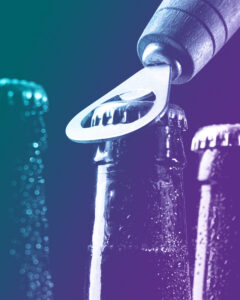Alcohol Tapering
“This is the last straw! I am taking Jaxson and Nova to my parents’ house. Expect a notice from my lawyer because I am done! I have given you every chance to fix this, fix us! But you have clearly chosen, alcohol means more to you than our family. Have a nice life and I truly pray that you get help.”

The door slams. You are frozen, partially in shock because, despite the events that unfolded, you still need a drink. This happened so suddenly. You only lost your job three months ago. Honestly, you hated that job and were so excited to be home with your two kids while your wife pursued her career.But somewhere along the way, you started drinking, and by drinking, you mean a fifth every two days if not every day. Your father was the same way, your mother begging for change. You can vividly remember your wife attempting to talk to you, but you were so drunk that the memory is just a blur.
You were ready to stop. But every time you did, the shakes started. Sweat would bead on your forehead as thoughts of being dead seemed to be a dream as opposed to a nightmare. You felt like your heart would burst if you didn’t at least take a quick swig from the bottle. You read online that it is possible to taper off of alcohol, reducing how much you drink each day. Trying to switch to beer, you manage to make it two days before turning back to your old habits. After trying to quit for the fourth time, she finally left, knowing that you were trapped in the vicious cycle that is alcohol addiction.
In Hillsborough County, 17.1% of adults participated in binge or heavy drinking in 2019. At Clean Recovery Centers, we understand the toll alcohol can take on relationships and careers. Using a unique three-phase approach, our alcohol use disorder program addresses every aspect of addiction and also explores mental health. Our blogs serve as a resource for loved ones to understand different scenarios their spouse or child may be going through. Today, we are discussing alcohol tapering, and how to safely stop alcohol use.
Understanding The Basics of Alcohol Tapering
Tapering is a term used when someone is using or doing less of something in the hopes of quitting. This is not just a substance misuse term – people will often try to taper the amount of caffeine they drink, the number of times they check their phone, and even the number of times they bite their nails. Essentially, tapering is a way to wean from a bad habit.
Tapering is used because relearning life without the habit is difficult. However, in the case of certain substances – such as alcohol – the body is physically dependent and needs the substance to function. Going from a fifth of vodka a day to none is shocking to the system, and physical symptoms can be felt. But going from a fifth of vodka a day down to none over the span of a few weeks can help the body adjust to functioning without alcohol.
Strategies To Taper Off Alcohol
In order to taper off alcohol, certain measures need to be put into place. Having a strong support system is crucial for success. Talking through emotions, physical discomfort, and mental health trials can make the taper less stressful. A safe and stable environment will also help to taper off alcohol more successfully. In chaos, it can be easy to return to old habits of drinking. When someone trying to taper off alcohol is living with someone managing another substance use disorder, it is possible to fall into the patterns of past ways.
What Happens to The Body When You Quit Alcohol Cold Turkey?
 The term “cold turkey” means that the person stops drinking right then and there, no matter how much they were drinking before. This phrase was coined because those who do this tend to sweat while having cold chills. While many people have been able to quit alcohol through this method, it is not recommended without medical intervention.
The term “cold turkey” means that the person stops drinking right then and there, no matter how much they were drinking before. This phrase was coined because those who do this tend to sweat while having cold chills. While many people have been able to quit alcohol through this method, it is not recommended without medical intervention.
The brain is all about chemical balance. Substances like alcohol disrupt this balance, releasing reward chemicals such as dopamine even when the reward system is not triggered. This leads to the brain attempting to restore balance, and as more alcohol is consumed, the brain adjusts for its presence. Dopamine receptors become dulled and eventually only release when alcohol is in the body. When alcohol is stopped suddenly, this causes the dopamine receptors to stay silent, which raises the stress response. As withdrawal symptoms set in, anxiety increases due to the lack of dopamine.
Is It Dangerous to Quit Alcohol Cold Turkey?
In short, yes, it can be very dangerous to quit alcohol cold turkey, especially for those who have been drinking heavily for long periods. As mentioned above, when the brain gets used to having alcohol, it adjusts chemical balances accordingly. Take alcohol away, and the brain floods the system with signals and reactions. Seizures can occur in alcohol withdrawal, especially when done cold turkey. A seizure can lead to aspiration and possibly loss of life when not attended promptly.
One of the dangers of quitting cold turkey involves return to use. Say you stopped drinking four days ago, and you feel better than ever. Two weeks in, you still feel good, but then a stressful event happens. It could be multiple things – your wife is pregnant, you were laid off, you fell and broke a bone. All of these situations lead you back to drinking. But your body has started to adjust without it, now you pour a few stiff drinks back into your system. The amount you were drinking before is no longer tolerated by your body. Alcohol poisoning can set in at this moment, and medical help is necessary.
Signs & Symptoms of Alcohol Withdrawal
Alcohol withdrawal is one of the main reasons for continued use even when wanting to stop. The most common alcohol withdrawal symptoms are:
- Irritability
- Anxiety
- Shakiness
- Restlessness
- Headaches
- Nausea or gastrointestinal issues
- Tremors
- Hallucinations
- Seizures
As with the stages of alcoholism, there are stages of withdrawal. The first 12 to 24 hours will show an increase in anxiety and heart racing. Sweating is also common. As the next 24 to 48 hours happen, intervention may be needed. Monitoring heart rate and blood pressure can indicate if there is an issue within the body. If mental distress evolves into thoughts of self-harm or suicide, seek medical attention immediately.
Taking Charge of Your Drinking Through Tapering
Deciding to stop drinking can be empowering and the thought of tapering can sound easy. Alcohol affects the central nervous system, and with this can ensue a myriad of side effects. Even with a strong mental capacity, tapering off alcohol can be physically demanding. Support and open communication will be key to getting through this process. Return to use can result in detrimental effects, but knowing who to turn to and when to reach out are the only tools for success.
Getting Treatment for Alcohol Use Disorder in Tampa
Wanting to quit alcohol can be easier said than done. Having the realization that alcohol is affecting your life negatively is already the first step in the right direction. Communication will be the key to getting through this time. Alcohol is readily available and having support to turn to when temptation strikes can set you up for a successful recovery. For many, seeking alcohol use disorder treatment will make success much more attainable.
If you or someone you love is trying to taper off alcohol with little to no success, it is time to talk about treatment. At Clean Recovery Centers, we understand the trials and tribulations that alcohol can take on lives. We not only utilize individual therapy, but also family therapy to help repair the bonds alcohol may have broken. Wellness components such as yoga and nutritional counseling give our clients the start of healthy coping skills to use once outside of treatment. Call us today at (888) 330-2532 to learn more about our different facilities and our three-phase approach to addiction treatment.
FAQs
What are the effects of cutting down on drinking?
Cutting down on drinking when the body is dependent can trigger mental side effects that are unpleasant, and without proper coping skills, they can be life-threatening.
What to expect when cutting back on alcohol?
Withdrawal symptoms are something to expect when cutting down on alcohol. These can include nausea, mood swings, increases in anxiety and depression, shakiness, trouble sleeping, and seizures.
How long after stopping drinking does the liver repair?
There is variation to liver repair depending on the timeframe of drinking. For those who have been drinking for long periods and have entered the stage of cirrhosis, liver damage is irreparable at this point. At any time before this diagnosis, the liver is able to heal, but it can take up to ten years in order to heal fully.


